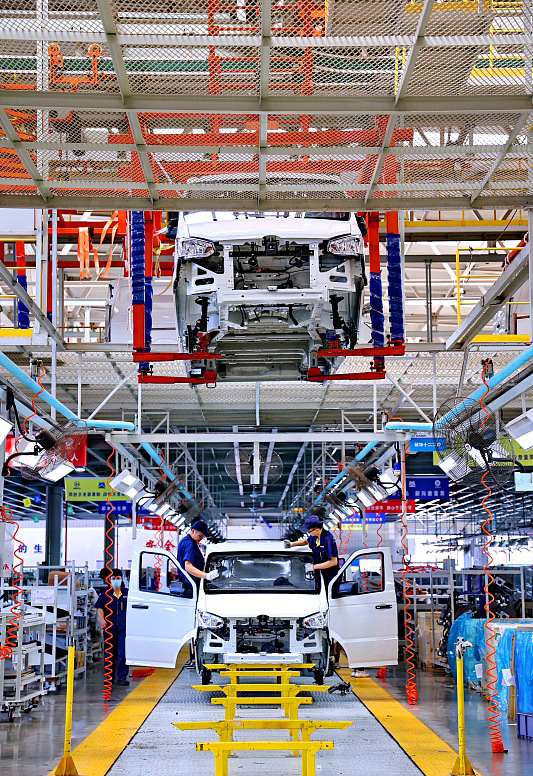China forges ahead with green transition in midst of global energy crisis (3)
A new energy car is assembled in a factory in Ganzhou, Jiangxi province, this month. ZHU HAIPENG/FOR CHINA DAILY
All part of the plan
A chief reason China has been able to keep targets in sight is that climate commitments have been embedded in its 14th Five-Year Plan (2021-25).
China's five-year plans are a set of social and economic initiatives that act as a blueprint for national development strategies for the period. The five-year plan is arguably one of the most important documents in the world when it comes to climate change.
Transformative measures on energy consumption and emissions in the last three five-year plans have led to unprecedented surges in green development. China invested $758 billion in renewable energy capacity between 2010 and mid-2019, which was equivalent to a third of the global total, according to United Nations data.
The 14th Five-Year Plan set binding targets for emissions peaking, carbon intensity and energy consumption, and also promoted low-carbon transformation in industry, construction, transportation and other key areas of the economy.
Last year, China's national energy consumption per unit of GDP fell by 2.7 percent year-on-year, and carbon dioxide per unit of GDP fell by 3.8 percent, according to analysis from the Center for China Study, or CCS, which is a think tank connected with Tsinghua University and the Chinese Academy of Sciences.
CCS Director Hu Angang said that China is "spurring the green renewable-energy revolution", with clean energy accounting for 25.5 percent of total energy consumption last year, up 1.2 percentage points year-on-year.
China will once again overachieve on renewable targets, according to the CAT, which found that growth in nonfossil energy shares and solar and wind capacity installations will "surpass the country's official nationally determined contribution targets".
The proliferation of renewables over the past decade in China has occurred at such a scale that it has influenced global markets, bringing down the cost of clean power in comparison to fossil fuels.
"China has already helped to accelerate the global uptake of solar by reducing the costs of manufacturing," Stern said. "The global market for renewable energy is expanding rapidly, and China is likely to remain a global leader in both the supply of and demand for renewable technologies."
Stern said that the transition away from coal and toward renewables is essential, from both an environmental and financial perspective, since emissions-heavy power sources run the risk of becoming stranded assets.
"China clearly recognizes the need to accelerate its transition away from coal as a source of energy because of the huge damage it inflicts through air pollution and climate change," Stern said. "Any new investments in fossil fuel infrastructure risk financial loss as they are likely to be replaced by zero-carbon alternatives before making a return. China's power system needs urgent reform to allow it to more quickly replace expensive coal with cheaper renewables."
 |  |
Photos
Related Stories
- Energy crisis exacerbates Germany's housing problem
- China's energy system withstands tests of COVID-19, global volatility
- China's power battery output surges over 101 pct in September
- Mood worsens in Europe as economy compounded by multiple risks
- China expedites energy sector's green shift over decade: report
- Feature: Chinese enterprise helps renewable energy transition in Jordan
- European, American "dirty energy" policies seen as blow to global climate governance
- Greece proposes 80-bln-euro EU energy fund to address soaring gas prices
Copyright © 2022 People's Daily Online. All Rights Reserved.










